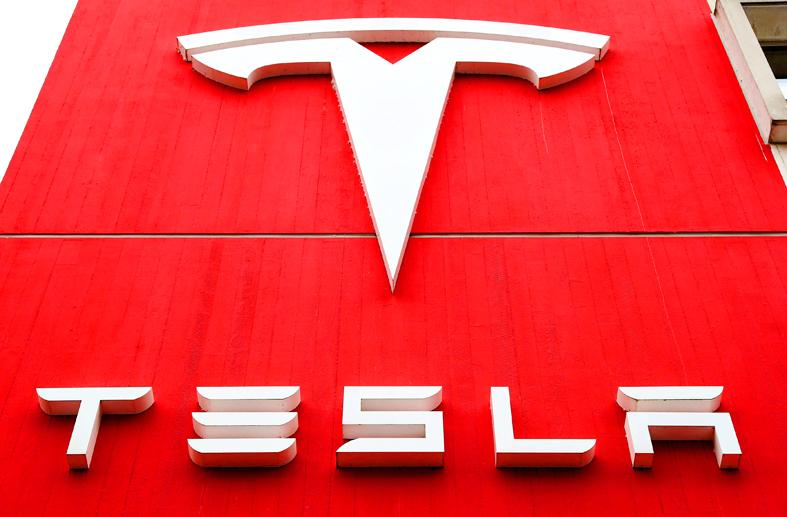Neoen SA yesterday said that it is to partner with Tesla Inc to install one of the world’s biggest lithium-ion batteries in Australia after reaching a grid connection deal with the power market operator.
The 300 megawatt Victorian Big Battery is planned for Geelong in Victoria state and use Tesla’s Megapack technology.
It would be double the size of Neoen’s Hornsdale site in South Australia state, which was the largest facility when it began operations in 2017.

Photo: Reuters
Installing the new system in Australia’s second-most populous state would help to modernize and stabilize the local grid, which is targeting 50 percent of its power to come from renewable sources by 2030, Neoen said in a media release.
The Paris-based company is targeting the battery to be operational by the end of next year.
Battery storage technology is being deployed on an ever-growing scale to meet demand to back-up the surge in wind and solar power generation.
About US$951 billion would be invested in the technology through 2050, with two-thirds deployed on utility-scale systems, BloombergNEF forecasts showed.
Tesla is seeing rising demand for grid-scale batteries and the new Australian project would offer further evidence that the systems are suitable to back up intermittent wind and solar power, Tesla chairwoman Robyn Denholm told a webinar.
“What we’re seeing is many energy operators around the world don’t want to renew their fossil fuel-type turbines, they want to put storage in, they want to harness renewable energy,” Denholm said.
Tesla founder Elon Musk has previously said that the firm’s energy business could one day rival its electric vehicle division in size.
Neoen’s Hornsdale lost its status as the world’s biggest storage battery to a facility near San Diego, California, which began operations this year. Several other larger battery projects are planned, including in the US and China, BloombergNEF data show.
“The big battery will help protect our network in summer, create jobs and drive down energy prices, as well as supporting our recovery from the coronavirus pandemic,” Victoria Minister for Energy, Environment and Climate Change Lily D’Ambrosio said in a separate statement.
The new project in Victoria would be supported by a 250 megawatt grid services contract with the Australian Energy Market Operator and would also partner with network provider AusNet Services, Neoen said.

South Korea’s equity benchmark yesterday crossed a new milestone just a month after surpassing the once-unthinkable 5,000 mark as surging global memory demand powers the country’s biggest chipmakers. The KOSPI advanced as much as 2.6 percent to a record 6,123, with Samsung Electronics Co and SK Hynix Inc each gaining more than 2 percent. With the benchmark now up 45 percent this year, South Korea’s stock market capitalization has also moved past France’s, following last month’s overtaking of Germany’s. Long overlooked by foreign funds, despite being undervalued, South Korean stocks have now emerged as clear winners in the global market. The so-called “artificial intelligence

‘SEISMIC SHIFT’: The researcher forecast there would be about 1.1 billion mobile shipments this year, down from 1.26 billion the prior year and erasing years of gains The global smartphone market is expected to contract 12.9 percent this year due to the unprecedented memorychip shortage, marking “a crisis like no other,” researcher International Data Corp (IDC) said. The new forecast, a dramatic revision down from earlier estimates, gives the latest accounting of the ongoing memory crunch that is affecting every corner of the electronics industry. The demand for advanced memory to power artificial intelligence (AI) tasks has drained global supply until well into next year and jeopardizes the business model of many smartphone makers. IDC forecast about 1.1 billion mobile shipments this year, down from 1.26 billion the prior

NEW IDENTITY: Known for its software, India has expanded into hardware, with its semiconductor industry growing from US$38bn in 2023 to US$45bn to US$50bn India on Saturday inaugurated its first semiconductor assembly and test facility, a milestone in the government’s push to reduce dependence on foreign chipmakers and stake a claim in a sector dominated by China. Indian Prime Minister Narendra Modi opened US firm Micron Technology Inc’s semiconductor assembly, test and packaging unit in his home state of Gujarat, hailing the “dawn of a new era” for India’s technology ambitions. “When young Indians look back in the future, they will see this decade as the turning point in our tech future,” Modi told the event, which was broadcast on his YouTube channel. The plant would convert

People stand in a Pokemon store in Tokyo on Thursday. One of the world highest-grossing franchises is celebrated its 30th anniversary yesterday.